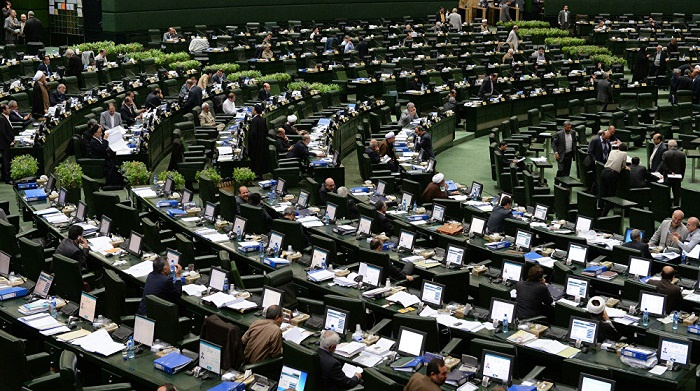Iran Reaches Out To US Assets in Tit-For-Tat

Iran’s outgoing parliament has approved the general outlines of a plan that obligates the administration to seek damages from Washington over its atrocities and crimes against Iran and its nationals in the past 63 years. The move comes as a rare instance of solidarity between the Principlist-dominated Majlis and Rouhani’s moderate administration, in response to a recent US Supreme Court ruling that clears the way for families of victims of the 1983 Marine barracks bombing in Beirut and other attacks to collect nearly $2bn in frozen Iranian funds. Iran has denied involvement in the attacks and condemned the ruling as “highway robbery”.
The bid is a desperate retaliatory move through which Iran hopes to seek compensation for ‘spiritual and material damages’ it has gone through during decades-long tensions with the United States. As Al-Monitor puts it in a nutshell, these include “nationalist political figures, civilian airline passengers, chemical warfare survivors, businessmen caught up in sanctions enforcement and average people harmed by decades of sanctions”.
Iranian lawmakers have made their own modification, dropped a few and added some. The list of damages in the proposed law now includes a 1953 coup d’état that overthrew Prime Minister Mohammad Mosaddegh, the destruction of oil platforms in the late 1980s, the Nojeh coup plot and US support for Saddam Hussein during the eight-year Iraqi-imposed war. The United States acknowledges its role in the 1953 coup and its support of Iraq in the war with Iran, but says it took action against the Iranian oil platforms as retribution.
The bill, which will most probably pass into law, also includes damages inflicted by the 1987 Haji massacre in Mecca, which led to the death of 275 Iranians, plus those of the 2015 Mina stampede in which more than 400 Iranians were killed. The parliament is also seeking compensation for, among other things, 17,000 victims of assassination, the martyrdom of 223,600 soldiers in the eight-year Iraqi-imposed war, and more recently for damages for “blocking, confiscating or seizing of assets belonging to Iranian government, organizations or public and state-owned organizations and officials of Iran”.
The outlines of the bill were passed on Tuesday with 174 votes in favor and seven against. Four MPs abstained. Outspoken legislator Hamid Rasa’ei proposed a controversial amendment to the bill as it was being debated by the lawmakers, saying Iran should "seize US assets" passing through the Strait of Hormuz in response. “If the US should seek to misappropriate the Iranian nation’s assets, the strait must be turned into an insecure place for them and US vessels banned from passing through it,” he said, noting that such a countermeasure would be both “logical and legal.”
Rasa’ei quoted ex-Supreme Leader Ayatollah Khomeini as resembling the United States to a rabid dog that chases if you run away and runs away if you chase it. Rasa’ei said the Rouhani administration’s dominant policy is to run away from the US.
Iran’s vice president for parliamentary affairs, Majid Ansari, argued against the proposal, saying such issues are within the powers of the Supreme National Security Council and insecurity in the Persian Gulf would be detrimental to Iran’s interests, IRIB News reported. He said the proposal appears to be revolutionary but is against national interests and the constitution.
Another hard-liner MP Mahdi Kouchakzadeh advocated Rasa’ei proposal, saying the parliament’s response should be in proportion with what the US Congress does against Iran.
Majlis Board of Directors’ member Mohammad-Hossein Farhangi also said the proposal is inconsistent with Principle 110 of the constitution which specifies any such moves that require military intervention within the powers of the country’s commander in chief, namely the Supreme Leader. Sure, the amendment proposed by Rasa’ei was not approved.
In a parallel development on Tuesday, Justice Minister Mostafa Pour-Mohammadi also told reporters Iran’s Supreme National Security Council had given the green light to take the case of the frozen assets to the Hague-based International Court of Justice.
During the debates over the recent bill in the parliament, Kouchakzadeh expressed skepticism that international arbitrators would also rule in favor of the US, as they are the superpower’s “mercenaries”.
The unspecified amounts of compensation and the non-existence of an executive by-law are among obstacles Iran’s foreign ministry will face to enforce the law. More importantly, as much as we know, Iran has little or no access to US assets and that perhaps explains why previous compensation verdicts, reportedly worthup to $50b, have never been cashed in.
Iran has pledged to spare no efforts to take back its stolen money. Last month, President Hassan Rouhani said: “The government will never allow for the money that belongs to the Iranian nation to be easily gobbled up by the Americans.” Now the administration seems to be bidding farewell to the outgoing principlist Majlis on amicable terms, and, as a deputy foreign minister said on Tuesday, Tehran will support the bill. “We are sure the measure will send a definitive message to the US and those who seek to encroach on Iran’s assets,” Fars News Agency quoted Abbas Araghchi as saying.

